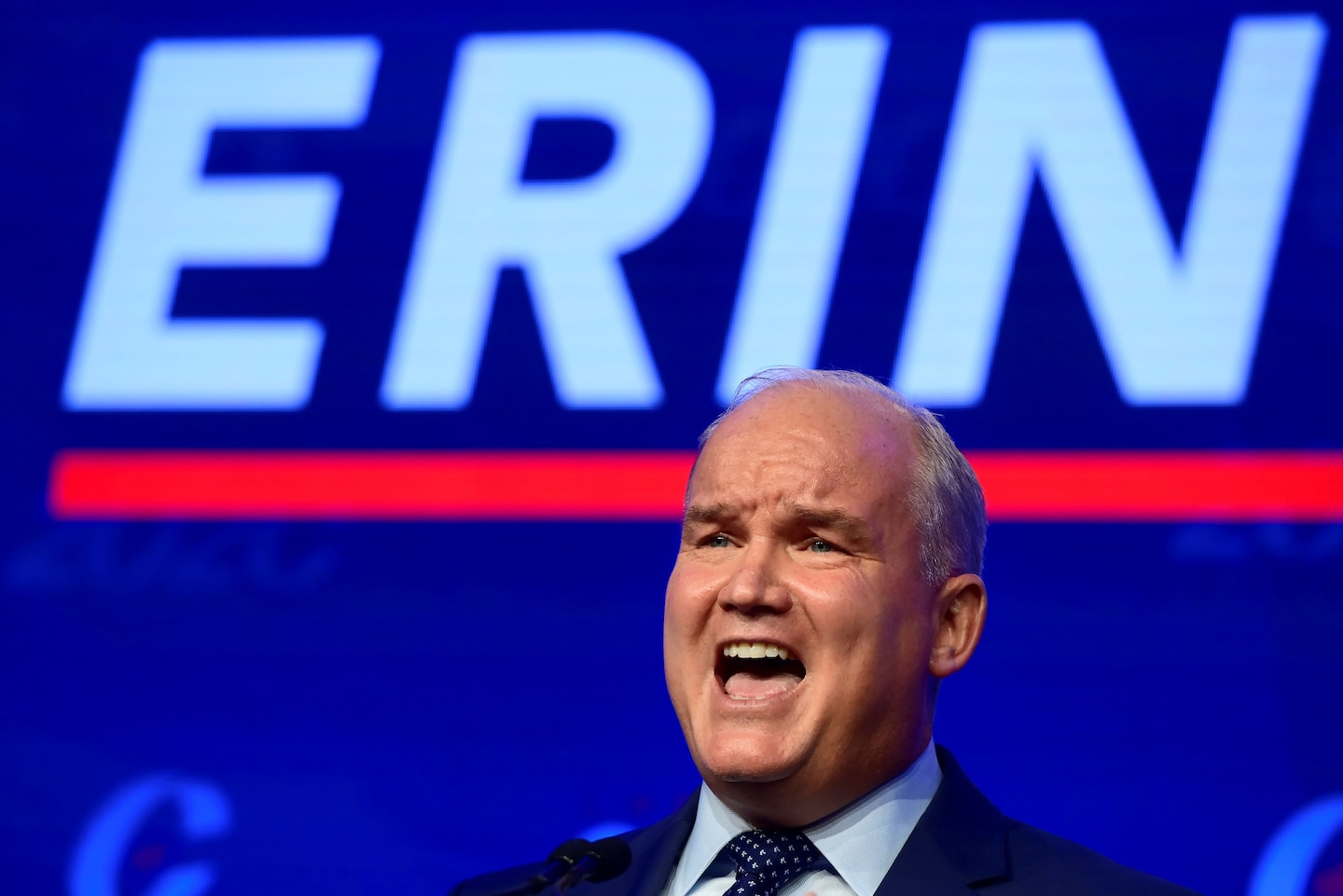Canadian Conservatives choose Erin O’Toole to lead fight against Trudeau

The announcement was expected Sunday, but delayed for several hours after a malfunctioning mail-opening machine ripped several thousand ballots, forcing volunteers to tape them together and re-mark them by hand under the watch of scrutineers.
O’Toole takes over the party at a critical time in Canada, with more than 9,000 people dead from the novel coronavirus, the country attempting to reverse a steep economic downturn and Trudeau’s government reeling from an ethics controversy.
His election comes nearly 10 months after an acrimonious and uninspiring federal election in which the Conservative Party, led by Andrew Scheer, failed for the second time in a row to defeat Trudeau’s Liberals, who were mired in a string of scandals.
Scheer faced harsh criticism, including from party members, for a lackluster campaign in which he struggled to define himself to voters and to expand support for the party outside its base. His opposition to abortion and same-sex marriage made him unpalatable to some voters.
MacKay, O’Toole’s chief rival in the leadership contest, said Scheer’s views on social issues hung around his neck “like a stinking albatross.”
Scheer said in December he would step down as leader but stay on until a successor was picked.
O’Toole was born in Montreal but grew up in Ontario. He joined the Canadian Forces after graduating from high school and was an air force pilot, conducting search and rescue and maritime surveillance operations. He later became a lawyer.
O’Toole was first elected to Parliament in a 2012 by-election and briefly served as veterans affairs minister in Harper’s government. He ran for the Conservative Party leadership in 2017 but finished in third place. He is currently the party’s foreign affairs critic.
O’Toole cast himself as a “true blue” Conservative and railed against “cancel culture,” disparaging MacKay as “Liberal-lite.” He pledged to repeal the federal price on carbon but make “industry pay” under a “national industrial regulatory and pricing regime.” He also promised to knock down interprovincial trade barriers and ban Huawei from Canada’s 5G networks.
O’Toole has said he supports LGBT rights and a woman’s right to choose to have an abortion, but he also tried to court socially conservative voters, saying at a debate that it’s important to “respect all our members.” He earned a key endorsement from Alberta Premier Jason Kenney, one of the most prominent Conservatives in the country.
“Today, you have given me a clear mission to unite our party, to champion our Conservative principles, to show Canadians what we know so well: that Justin Trudeau and his team are failing our great country,” O’Toole said in his victory speech. “We must continue to point out Liberal failings and corruption, but we must also show Canadians our vision for a stronger, prosperous and more united Canada.”
Like nearly everything else, the race was reshaped — and overshadowed — by the pandemic.
The party had planned to announce its new leader at a lively party convention in Toronto in June, but the race was suspended and the vote rescheduled. The results were announced after midnight Monday in a largely empty room at an Ottawa convention center.
The vote, which used a ranked ballot, was restricted to the nearly 269,500 dues-paying members of the Conservative Party. More than 175,000 cast ballots — the most for the election of a federal party leader in Canadian history. The party always allows mail-in voting, but this year, the entire election was conducted by mail.
“It hasn’t been a race that’s been filled with big ideas and big dreams and hope and change and Make Canada Great Again,” said Conservative strategist Tim Powers. He said that was in part “deliberate” because the four candidates needed to appeal only to party members and not the general electorate to win.
Analysts said O’Toole will need to focus on party unity and on articulating an overarching vision for a post-pandemic Canada. He must work to expand the party’s appeal beyond its traditional base in rural Canada and the strongholds of Alberta and Saskatchewan to draw support from young voters and those in fast-growing urban and suburban centers.
“If the Conservatives go out campaigning by simply suggesting that Justin Trudeau is a loser and he’s not fit for the job, I think they’re not going to succeed this go around,” said Powers, vice chairman of public affairs consulting firm Summa Strategies.
Nik Nanos, a pollster, pointed to a different obstacle.
“I think the biggest challenge for the Conservative Party will be to define how a Conservative ideology works in an era of big government, big spending and big stimulus,” he said.
O’Toole will need to start preparing for an election almost immediately.
Trudeau’s Liberals, weakened to a minority in the last election, are embroiled in an ethics controversy over their decision to award a now-canceled contract to run a student grant program to a charity with close ties to the prime minister and his former finance minister.
Trudeau last week asked the governor general, Queen Elizabeth’s representative in Canada, to suspend Parliament until Sept. 23. The government will then outline its plan for a post-pandemic recovery in a speech put to a confidence vote. Failure to secure support could trigger an election.
O’Toole put the Liberal Party leader on notice.
“The Conservative Party will be ready for the next election,” O’Toole said. “And we will win the next election.”






